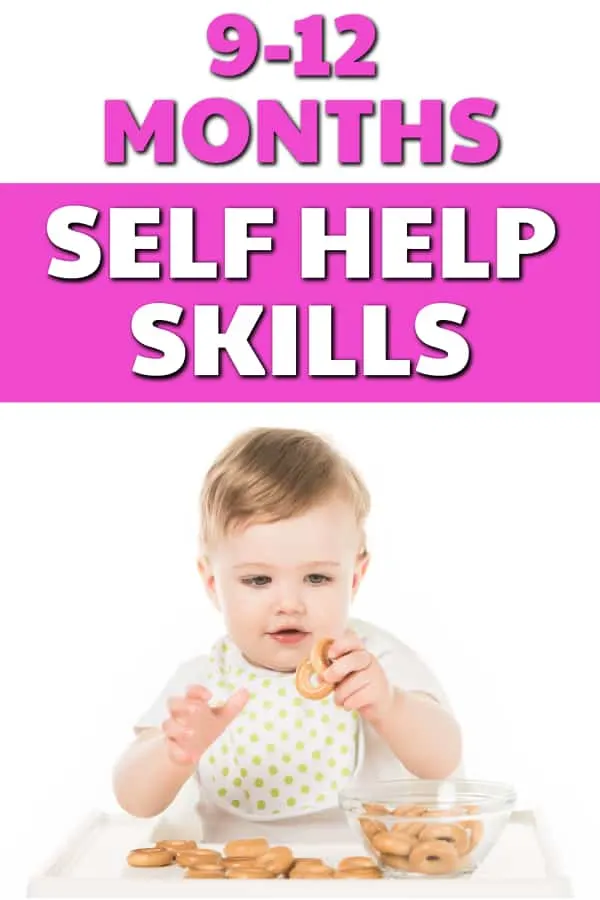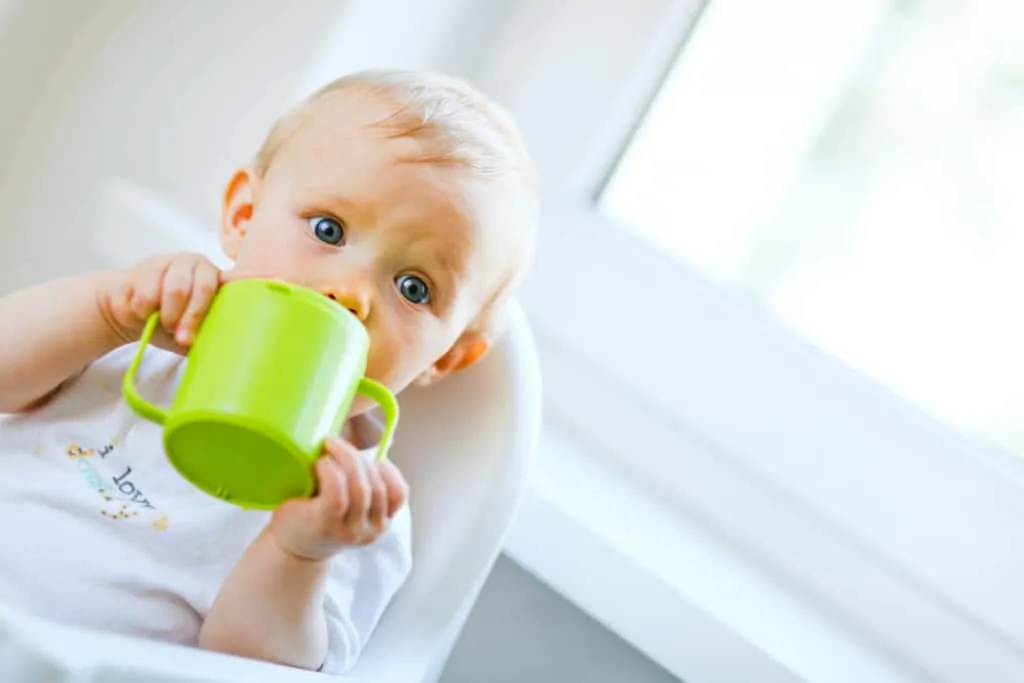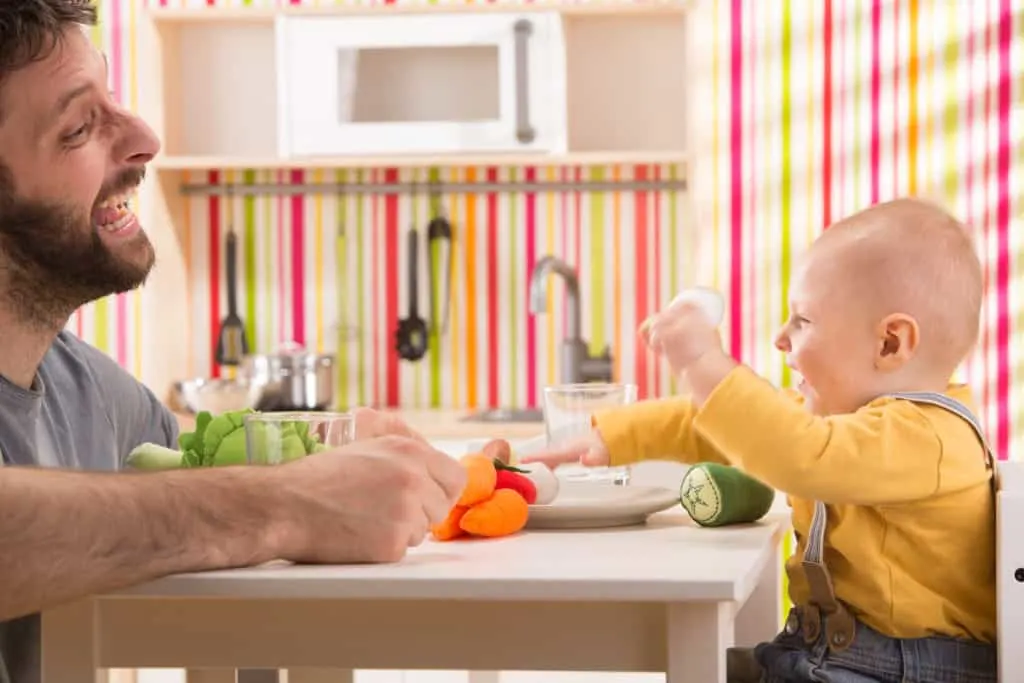Your baby is now almost a year and I bet you can not believe how different they are from birth!
Their adaptive skills at 9-12 help them become more independent in their daily routine tasks such as eating, dressing, and sleeping.
Let’s take a look at what self help milestones look like in babies 9-12 months.
We will also cover some simple tips on how to encourage your baby’s self help skills as well.
If you ever have concerns about your baby’s development always contact early intervention for a free screening or assessment.
Self Help Development 9-12 Months

(This post contains affiliate links. To read our full disclosure policy click here.)
What Do Self Help Skills Look Like From 9-12 Months?
Starts to Finger Feed
Your baby is most likely still taking either breastmilk or formula but solid foods are starting to become more common.
Between 9-12 months your little one will start gaining the skills to use their fingers to maneuver pieces of food and bring it to their mouth.
You can also allow them to try and hold a spoon during feeding times.
You will also notice that your child’s chewing becomes more coordinated during this time as well.

Drinking from a Cup
If you haven’t already you can now introduce drinking from an open cup.
Your baby will need some assistance most likely when it comes to holding the cup and tipping it back.
Daytime and Nighttime Sleep
Your baby should be sleeping about 12-14 hours at night.
It is possible that your little one still wakes up to feed.
Your child may also have frequent wake ups due to lots of developmental milestones happening from 9-12 months.
As they learn to crawl, stand, and walk it can often times disrupt sleep.
Your baby may still be taking two naps a day, however some babies will skip the morning nap and be ready to go down to just one nap a day.

Cooperates When Getting Dressed
Your baby is now starting to help out a bit when getting them dressed.
This means they will extend their leg to get it through their pants or push their arms through when putting a shirt on.
How Can I Encourage Self Help Skill Development from 9-12 Months In My Baby?
There are many way that you can work on self help skills with your infant through play time and daily routine.
For more ideas on how to encourage development everyday make sure you are following me on instagram at @baby.toddler.teacher.
Learning to Finger Feed
You can encourage finger feeding by giving your baby just a few bitesize pieces of food during meal time.
This could be things beans, pasta, or avocado.
For a full list of food to try for finger feeding click here.
Always monitor your baby closely when self feeding as babies don’t always know what amount of food is safe in their mouths.
Let your baby be as independent as they can when they are trying to feed themselves.
Feel free to give assistance when needed but try to avoid over helping.
Make self feeding a positive experience for your child by telling them the names of the foods they are enjoying and describe the colors and textures.
Build Sleep Routines
One of the best ways to encourage healthy sleep habits is by setting bedtime and naptime routines.
This could including reading a short story or listening to some calming music.
You will also want to keep the time that you put your little one down for rest each day as consistent as possible.
Encourage Cup Drinking
Sippy cups are great for avoiding spills but learning to drink from an open cup is an essential skill for little ones.
You can start by introducing open cups during play time.
During playtime let your baby play and explore cups so they can get comfortable with them.
One common mistake parents make is putting just a little liquid in the bottom of a cup and then tipping it back for their child to drink from.
Instead you want the cup full almost to the top so your baby can feel the liquid touch their lips when they tilt it back and they can learn to take sips.

What Toys Work Well to Develop Self Help Skills?
One of my favorite types of toys to introduce at this age is kitchen sets and play food.
A simple fruit and vegetable cutting set (this is the one we have) is perfect for babies to get familiar and have fun with different fruits and vegetables.
It is also great for encouraging fine motor development.
A kitchen set (like this) can provide your little one with lots of ways to participate in pretend play and learn new vocabulary that they can use in everyday routines.

Grab your FREE Milestone Guide HERE.
Related Posts You will Enjoy
Best Baby Floor Mat for Crawling
Encouraging Language Development in Early Childhood
Spanish for Babies: How to Get Started
Guide to 9-12 Months Communication Development


Kayla O’Neill has a master’s degree in education as well as a bachelor’s degree in special education with an emphasis in early childhood education. She has been working as a developmental therapist with babies and toddlers in early intervention since 2012. She is also a mom with two young children.